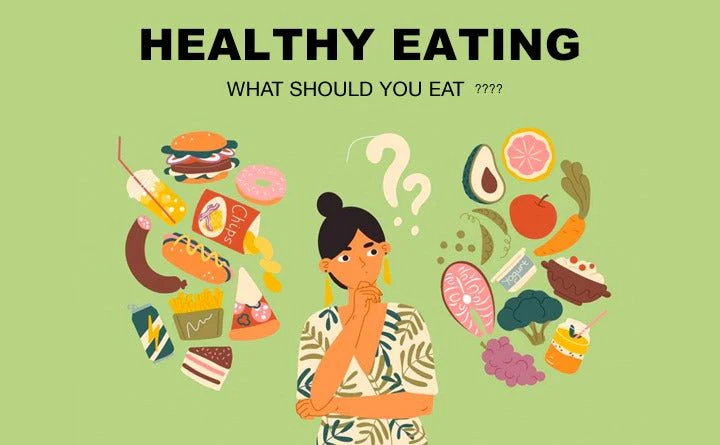The Importance of Healthy Eating: Fueling Your Body for a Better Life
Healthy eating is one of the most important choices you can make to improve your overall health and well-being. With the right diet, you can boost your energy levels, improve mental clarity, and reduce the risk of chronic diseases. However, healthy eating is not just about counting calories or following the latest diet trends; it’s about choosing a balanced, nutritious diet that supports your body’s needs. In this article, we’ll explore the key principles of healthy eating, its benefits, and practical tips to incorporate healthy habits into your daily life.
1. A Balanced Diet: The Foundation of Healthy Eating
A balanced diet is essential for good health. It includes a variety of foods from all the food groups: fruits, vegetables, lean proteins, whole grains, and healthy fats. Each of these food groups provides essential nutrients that your body needs to function optimally. Eating a balanced diet ensures that you get a wide range of vitamins, minerals, and other nutrients to support your immune system, bones, skin, and overall energy levels.
2. The Role of Fruits and Vegetables
Fruits and vegetables are rich in vitamins, minerals, and antioxidants that support overall health. They are also high in fiber, which aids in digestion and helps maintain a healthy weight. Incorporating a variety of colorful fruits and vegetables into your diet ensures that you get a wide range of nutrients. Aim to fill half of your plate with vegetables and fruits at every meal to maximize health benefits.
3. The Power of Lean Proteins
Proteins are essential for muscle repair, immune function, and enzyme production. Lean proteins such as chicken, turkey, fish, legumes, and plant-based sources like tofu and quinoa provide the building blocks your body needs without excess saturated fats. Incorporating a variety of protein sources into your meals helps maintain muscle mass and supports overall bodily functions.
4. Whole Grains vs. Refined Grains
Whole grains, such as brown rice, quinoa, oats, and whole wheat bread, are packed with fiber and essential nutrients that refined grains, like white bread and pasta, lack. Fiber helps regulate blood sugar, supports heart health, and improves digestion. Choosing whole grains over refined grains can help you feel fuller longer and provide sustained energy throughout the day.
5. Healthy Fats for Heart Health
Not all fats are created equal. Healthy fats, such as those found in avocados, nuts, seeds, and olive oil, are beneficial for heart health and overall well-being. These fats help reduce inflammation, support brain function, and improve cholesterol levels. Avoid trans fats and limit saturated fats, which are found in processed foods and fatty cuts of meat, as they can increase the risk of heart disease.
6. Hydration: The Key to Optimal Health
Water is essential for maintaining hydration and supporting many of your body’s functions, including digestion, nutrient absorption, and temperature regulation. Aim to drink at least 8 cups (64 ounces) of water per day, or more if you are physically active or live in a hot climate. Additionally, herbal teas and water-rich foods like fruits and vegetables can help keep you hydrated throughout the day.
7. The Benefits of Meal Planning
Planning your meals in advance can help you make healthier food choices and save time during the week. By preparing meals ahead of time, you can ensure that you always have nutritious options on hand and avoid reaching for unhealthy snacks or fast food. Meal planning also helps you control portion sizes, reduce food waste, and avoid the temptation to overeat.
8. Moderation: The Key to Long-Term Success
While healthy eating is about making nutritious choices, it’s also about moderation. It’s okay to indulge in your favorite treats occasionally, but it’s important not to make them a regular part of your diet. Practicing moderation helps you maintain a healthy relationship with food and prevents feelings of deprivation. Focus on making healthy choices most of the time, but don’t feel guilty about enjoying an occasional indulgence.
9. Reducing Processed Foods
Processed foods, such as packaged snacks, sugary beverages, and fast food, are often high in unhealthy fats, sugar, and sodium. These foods can contribute to weight gain, high blood pressure, and other chronic health conditions. Reducing your intake of processed foods and replacing them with whole, unprocessed foods like fruits, vegetables, and whole grains can improve your health and energy levels.
10. Listening to Your Body’s Hunger Cues
Mindful eating involves paying attention to your body’s hunger and fullness cues. Instead of eating out of boredom or stress, listen to your body’s signals and eat when you’re hungry. Eating slowly and savoring your food can help you recognize when you’re full, preventing overeating. Mindful eating also encourages a healthier relationship with food and promotes better digestion.
11. The Role of Fiber in Healthy Eating
Fiber is a crucial component of a healthy diet, as it supports digestion, helps regulate blood sugar levels, and promotes heart health. Fiber-rich foods like fruits, vegetables, whole grains, and legumes should be included in your daily meals. Aim to get at least 25–30 grams of fiber per day from natural food sources.
12. The Importance of a Healthy Gut
A healthy gut is vital for overall health, as it plays a crucial role in digestion, immunity, and even mental health. Eating a diet rich in fiber, fermented foods (like yogurt and kimchi), and prebiotic foods (such as garlic, onions, and bananas) can support the growth of healthy gut bacteria. A balanced gut microbiome is essential for optimal digestion and overall well-being.
Conclusion
Healthy eating is a lifelong commitment to nourishing your body with the right foods to fuel your physical and mental health. By focusing on a balanced diet that includes a variety of nutrient-dense foods, staying hydrated, and practicing moderation, you can significantly improve your health, prevent chronic diseases, and enjoy a better quality of life. Remember, healthy eating is not about perfection; it’s about making mindful, sustainable choices that support your well-being.

